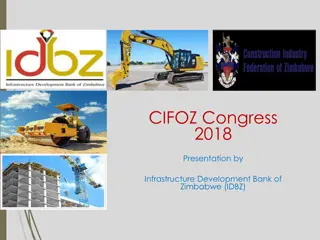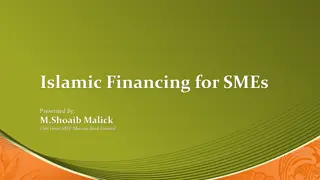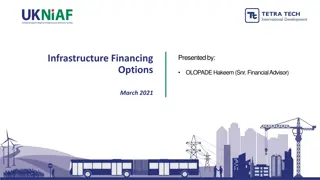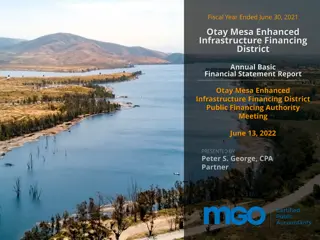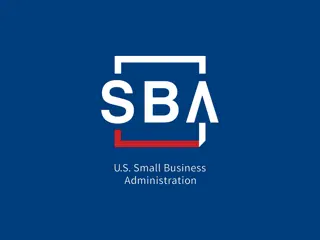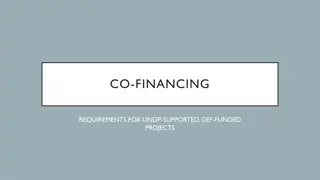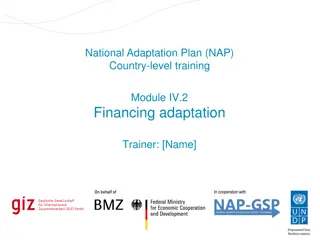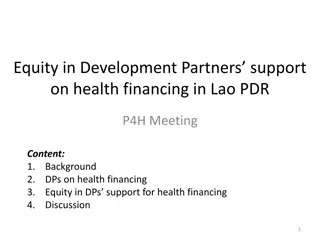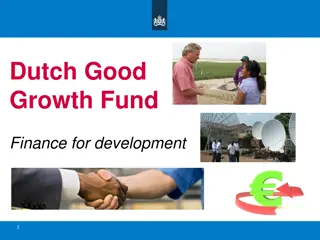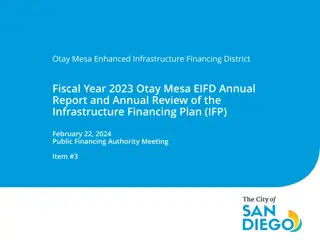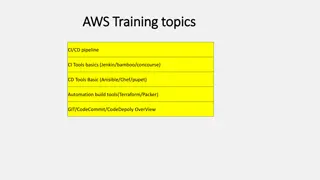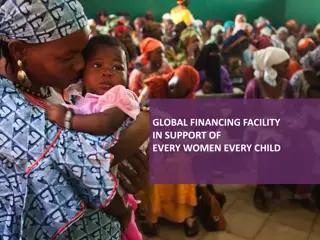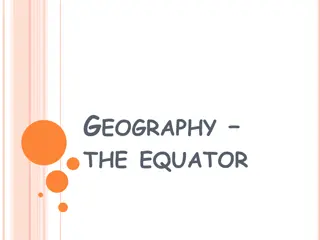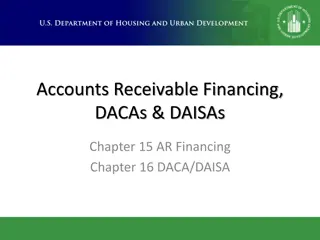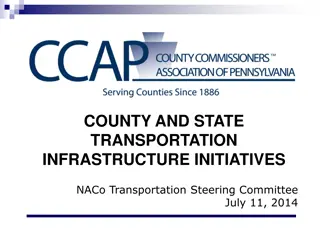Understanding and Applying the Equator Principles in Infrastructure Financing
The Equator Principles (EPs) set voluntary guidelines for managing social and environmental risks in project financing. They are globally recognized and crucial for securing financing from Equator Principle Financial Institutions (EPFIs). This presentation delves into the basic concepts, the Nigerian context, infrastructure financing, and implementation modalities of the EPs. With over 100 financial institutions in different countries adopting the EPs, compliance is essential for projects seeking funding from EPFIs.
- Equator Principles
- Infrastructure Financing
- Environmental Sustainability
- Social Risks
- Project Finance
Download Presentation

Please find below an Image/Link to download the presentation.
The content on the website is provided AS IS for your information and personal use only. It may not be sold, licensed, or shared on other websites without obtaining consent from the author. Download presentation by click this link. If you encounter any issues during the download, it is possible that the publisher has removed the file from their server.
E N D
Presentation Transcript
Understanding and Applying the Equator Presented by: OLOPADE Hakeem (Snr. Financial Advisor) Principle March 2021
Presentation Outline 1. The Equator Principles - Basic Concepts and Application 2. The Nigerian Context to Equator Principles 3. Infrastructure Financing and linkages to the Equator Principles 4. Conclusions and Take-outs 2
LearningObjectives 1. To understand basic principles of Equator Principles and application; 2. When and how to assure compliance within the Nigerian infrastructure delivery landscape; and 3. To understand implementation modalities.
The Equator Principles 1. Equator Principles Requirements. IFC s performance standards on Environmental and Social Sustainability ( Equator Principles (EPs) ) are a set of voluntary guidelines used in assessing and managing social and environmental risks in project financing. It was initiated in 2002 by a group of International Banks and the International Finance Corporation and has been adopted by several financing institutions. The most updated version of these principles is the Equator Principles, 2013 2. EP have become globally recognized good practice in dealing with environmental and social risk management. In the financial markets worldwide, the Performance Standards have been catalyzing the swift convergence of standards for cross-border project finance 3. The EP Guidelines comprise of 10 principles that guides compliance procedures for EP compliant projects and institutions 4. An Equator Principle Financing Institution EPFI is a financial institution that has adopted the Principles; an EPFI will not provide loans to projects, which are not developed in a manner that is socially responsible and reflective of sound environmental management practices 5. It is advised that projects be undertaken in a manner that complies with the Equator Principles so as to increase the chances of securing financing from an EPFI 6. 116 Financial Institutions in 37 Countries have adopted the EP with seven (7) Banks in Nigeria Access, Citibank, Ecobank, Fidelity, Rand Merchant Bank, Stanbic-IBTC, Standard Chartered Bank all EPFIs.
The Equator Principles- List of EPFIs Country of Headquarters Region of Headquarters Country of Headquarters Region of Headquarters S/N Institution Adoption Date Current EPFI Reporting S/N Institution Current EPFI Reporting Adoption Date 31 32 33 BNP Paribas 24-Oct-08 18-Nov-09 19-Mar-07 France Brazil Spain Europe Latin America Europe 2019 2019 2019 1 2 3 4 5 ABN Amro Absa Group Limited Access Bank Plc Ahli United Bank B.S.C. Arab African International Bank 03-Aug-09 22-Oct-09 04-Jun-09 01-May-11 25-Jan-09 The Netherlands South Africa Nigeria Kingdom of Bahrain Egypt Europe Africa Africa Middle East Africa 2019 2019 2019 2019 CAIXA Econ mica Federal CaixaBank Canadian Imperial Bank of Commerce (CIBC) Cathay United Bank Co., Ltd Chongqing Rural Commercial Bank CIBanco S.A. 34 03-Dec-03 23-Mar-15 27-Feb-20 07-Mar-12 Canada Taiwan R.O.C. China Mexico North America Asia Asia North America To 31 Oct 2019 2019 First Year Grace 2019 To 30 Apr 2019 35 36 37 Australia and New Zealand Banking Group Limited (ANZ) 6 15-Dec-06 Australia Oceania To 30 Sept 2019 Banco Bilbao Vizcaya Argentaria, S.A. (BBVA) Banco Bradesco, S.A. Banco de Cr dito Banco de Galicia y Buenos Aires S.A. 7 CIFI (Corporacion Interamericana Para El Financiamiento de Infraestructura S.A.) Citigroup Inc. Commonwealth Bank of Australia Co peratieve Rabobank U.A. Credit Suisse Group 18-May-04 08-Sep-04 22-Jan-13 19-Mar-07 Spain Brazil Peru Argentina Europe Latin America Latin America Latin America 2019 2019 2019 2019 38 8 9 06-Apr-07 04-Jun-03 26-May-14 04-Jun-03 04-Jun-03 Panama USA Australia The Netherlands Switzerland Latin America North America Oceania Europe Europe 2019 2019 39 40 41 42 10 To 30 Jun 2020 2019 2019 Banco de la Rep blica Oriental del Uruguay Banco do Brasil Banco Mercantil del Norte S.A. Banco Sabadell Banco Santander S.A. Banco Votorantim SA Bancolombia S.A. Bank of America Corporation Bank of Chongqing Bank of Guizhou Bank of Huzhou Bank of Jiangsu Bank of Montreal Bank of Nova Scotia Bank Sinopac Bankia Bankinter Barclays plc Bank of Africa BTG Pactual 11 03-Jan-08 06-Jul-06 12-Mar-12 29-Sep-11 30-Apr-09 30-Jun-16 11-Dec-08 15-Apr-04 02-Feb-21 30-Nov-20 24-Jul-19 20-Jan-17 15-Sep-05 25-Sep-06 27-Feb-20 18-Jul-18 12-Dec-16 04-Jun-03 10-May-10 31-Aug-20 Uruguay Brazil Mexico Spain Spain Brazil Colombia USA China China China China Canada Canada Taiwan R.O.C. Spain Spain UK Morocco Brazil Latin America Latin America North America Europe Europe Latin America Latin America North America Asia Asia Asia Asia North America North America Asia Europe Europe Europe Africa Latin America 2019 2019 2019 2019 2019 2019 2019 2019 12 13 14 15 16 17 18 19 20 21 22 23 24 25 26 27 28 29 Cr dit Agricole Corporate and Investment Bank CTBC Bank Co., Ltd DBS Bank De Volksbank DekaBank Deutsche Girozentrale Deutsche Bank AG Development Bank of Japan DNB DZ Bank AG E.SUN Commercial Bank, LTD Ecobank Transnational Incorporated Export Finance Australia Eksport Kredit Fonden Ex-Im Bank Export Credit Norway Export Development Canada Fidelity Bank Plc First Abu Dhabi Bank (FAB) 43 04-Jun-03 23-Jan-19 18-Nov-19 25-Nov-09 01-Mar-11 27-Jul-20 01-Jul-20 29-May-08 01-Jan-13 28-Dec-15 01-Jan-12 03-Mar-09 14-May-04 31-Mar-11 27-Jun-14 25-Oct-07 01-Nov-12 20-Sep-15 France Europe Asia Asia Europe Europe Europe Asia Europe Europe Asia Africa Oceania Europe North America Europe North America Africa Middle East 2019 2020 44 45 46 47 48 49 50 51 52 53 54 55 56 57 58 59 Taiwan R.O.C. Singapore The Netherlands Germany Germany Japan Norway Germany Taiwan R.O.C. Togo Australia Denmark USA Norway Canada Nigeria United Arab Emirates First Year Grace 2019 2019 First Year Grace First Year Grace 2019 2019 2019 2019 To 30 Jun 2018 2019 To 30 Apr 2020 2019 2019 2019 2019 First Year Grace First Year Grace First Year Grace 2019 To 31 Oct 2019 To 31 Oct 2019 First Year Grace To 31 July 2020 2019 2019 2019 First Year Grace 30 60
The Equator Principles- List of EPFIs Country of Headquarters Region of Headquarters Country of Headquarters Region of Headquarters S/N Institution Adoption Date Current EPFI Reporting S/N Institution Adoption Date Current EPFI Reporting 61 62 First Commercial Bank FirstRand Limited 21-Dec-20 13-Jul-09 Taiwan R.O.C. South Africa Asia Africa First Year Grace To 30 Jun 2018 91 92 93 94 95 96 97 98 99 100 101 102 Nordea Bank AB (publ) NWB Bank OCBC Bank OP Financial Group Royal Bank of Canada NatWest Group Plc Shinhan Bank Shinsei Bank, Limited Skandinaviska Enskilda Banken AB Soci t G n rale Standard Bank Group Standard Chartered PLC 21-Feb-07 01-Oct-20 01-Dec-20 16-Dec-16 21-Jul-03 04-Jun-03 09-Sep-20 01-Apr-20 03-Apr-07 03-Sep-07 02-Feb-09 08-Oct-03 Sweden Europe Europe Asia Europe 2019 The Netherlands Singapore Finland Canada Scotland South Korea Japan Sweden France South Africa UK First Year Grace First Year Grace 2019 To 31 Oct 2019 2019 First Year Grace First Year Grace 2019 2019 2019 2019 FMO (Netherlands Development Finance Company) Green Investment Group Limited HSBC Holdings plc IDFC FIRST Bank Industrial Bank Co., Ltd ING Bank N.V. Instituto de Cr dito Oficial (ICO) Intesa Sanpaolo SpA Ita Unibanco S.A. JPMorgan Chase & Co. KBC Group N.V. KB Kookmin Bank KfW IPEX-Bank GmbH Korea Development Bank La Banque Postale LBO France Lloyds Banking Group Plc Manulife Mauritius Commercial Bank Ltd. Mian Yang City Commercial Bank Mizuho Bank, Ltd. MUFG Bank, Ltd National Australia Bank Limited Natixis Nedbank Limited NIBC Bank N.V. Nippon Life Insurance Company NN Investment Partners 63 19-Oct-05 02-Dec-13 04-Sep-03 03-Jun-13 31-Oct-08 23-Jun-03 26-Oct-16 04-Aug-06 12-Aug-04 04-Dec-06 27-Jan-04 04/02/2021 03-Mar-08 02-Jan-17 15-Oct-19 02-Mar-20 31-Jan-08 11-May-05 15-May-12 20-Jul-20 27-Oct-03 22-Dec-05 25-Oct-07 30-Dec-10 10-Nov-05 09-Nov-10 01-Apr-19 02-Apr-19 The Netherlands UK UK India China The Netherlands Spain Italy Brazil USA Belgium South Korea Germany South Korea France France UK Canada Mauritius China Japan Japan Australia France South Africa The Netherlands Japan The Netherlands Europe Europe Europe Asia Asia Europe Europe Europe Latin America North America Europe Asia Europe Asia Europe Europe Europe North America Africa Asia Asia Asia Oceania Europe Africa Europe Asia Europe 2019 64 65 66 67 68 69 70 71 72 73 74 75 76 77 78 79 80 81 82 83 84 85 86 87 88 89 To 31 Mar 2020 2019 To 31 Mar 2019 2019 2019 2019 2019 2019 2019 2019 First Year Grace 2019 2019 First Year Grace First Year Grace 2019 2019 To 30 Jun 2019 First Year Grace To 31 Mar 2020 To 31 Mar 2020 To 30 Sept 2019 2019 2019 2019 To 31 March 2020 First Year Implementation North America Europe Asia Asia Europe Europe Africa Europe 103 Sumitomo Mitsui Banking Corporation 23-Jan-06 Japan Asia 2019 104 Sumitomo Mitsui Trust Bank, Limited Svenska Handelsbanken AB (publ) Taipei Fubon Commercial Bank Taishin International Bank Swedbank AB 01-Feb-16 23-Jun-16 04-Dec-17 11-Nov-19 28-Oct-19 Japan Sweden Taiwan R.O.C. Taiwan R.O.C. Sweden Asia Europe Asia Asia Europe To 31 Mar 2020 2019 2019 First Year Grace First Year Grace 105 106 107 108 Swedish Export Credit Corporation (SEK) TD Bank Financial Group The Norinchukin Bank UK Export Finance UniCredit SpA Wells Fargo Bank, N.A. Westpac Banking Corporation Yuanta Commercial Bank 109 21-Jun-17 12-Apr-07 01-May-17 31-Mar-16 04-Jun-03 12-Jul-05 04-Jun-03 08-Oct-20 Sweden Canada Japan UK Italy USA Australia Taiwan R.O.C. Europe 2019 110 111 112 113 114 115 North America Asia Europe Europe North America Oceania Asia To 31 Oct 2019 To 31 March 2020 To 31 Mar 2020 2019 2019 To 30 Sept 2019 First Year Grace 116 90
The Equator Principles- The 10 Principles Review and Categorization - The EPFI will categorize a proposed project based on its potential impact and risk according to the environmental and social screening criteria of the International Finance Corporation ( IFC ) 1. Social and Environmental Assessment -The Borrower is to conduct a Social and Environmental Assessment process to address relevant social and environmental impacts and risks of the proposed projects which fall under Categories A and B. 2. Category A - Projects with potential significant adverse social and environmental impacts that are diverse, irreversible or unprecedented Category B - Projects with limited adverse social or environmental impacts that are few in number, generally site-specific, largely reversible and readily addressed through mitigation measures Category C - Project with minimal or no social or environmental impacts. a. b. c. Applicable Social and Environmental Standards - Assessment will refer to IFC Performance Standards and applicable industry specific Environmental, Health and Safety Guidelines. The Assessment process would also address compliance with relevant host country laws, regulations and permits that pertain to social and environmental matters. In Nigeria, the 3 most important laws and/or guidelines are: 3. Environmental Impact Assessment ( EIA ) Act - mandates that an Environmental Impact Assessment be carried out at the inception of all public or private sector driven projects, which are likely to have a significant impact on the environment and which fall under the Mandatory Activities List (Schedule 1 of the EIA Act). It further provides that there is no exemption for projects undertaken by the Federal State or Local Government, their agencies or other third parties authorized by them (Section 13, EIA Act). National Environmental Standards and Regulatory Enforcement Agencies ( NESREA ) Act - NESREA has the power to issue licenses and permits which enable individuals, businesses or companies whose operations may have potential impact on the environment to carry on such activities within permitted limits. NESREA s permits and approvals may be obtained on a needs basis throughout a project duration CBN Sustainable Banking Guidelines -These principles were adopted to drive long-- term sustainable growth whilst focusing on development priorities, safeguarding the environment and our people, and delivering measurable benefits to society and the Real economy. a. b. c.
The Equator Principles -The 10 Principles Environmental and Social Management System and Equator Principles Action Plan - The EPFI will categorize an Action Plan The borrower is required to prepare an Environmental and Social Management System and Equator Principles Action Plan which addresses findings in the Assessment and addresses the management of the impacts, risks and corrective actions required to comply with applicable host country social and environmental laws and regulations, applicable Performance Standards and EHS guidelines as defined in the Action Plan 4. Stakeholder Engagement - The Government, borrower or third party expert is required to consult with project- affected communities in a structured and culturally appropriate manner 5. Grievance Mechanism - The borrower will establish a grievance mechanism as part of the management system which will allow the borrower receive and facilitate resolution of concerns about the project s performance raised by individuals and groups from project-affected communities 6. Independent Review - An independent social or environmental expert not associated with the borrower will review the Assessment, Action Plan and consultation process documentation to assess EPFI s due diligence and assess Equator Principles compliance. This will be done with particular reference to Project Finance and Project Related Corporate Loans For all Category A projects only, and as appropriate for Category B projects. 7. Convenants - The Borrower, in its financing documentation will be required to agree to comply with relevant host country social and environmental laws, regulations and permits; comply with the Action Plan during construction and operation of project; provide periodic reports in a format agreed with EPFIs that document compliance with the Action Plan and provide proof of compliance with relevant local, state and host country laws and regulations; decommission facilities in accordance with agreed decommissioning plan. 8.
The Equator Principles- The 10 Principles Independent Monitoring and Reporting - An independent environmental/social expert will be appointed by the EPFI to verify monitoring information, which would be shared with EPFIs. For all Category A projects only, and as appropriate for Category B projects. 9. 10. Reporting and Transparency - Each EPFI adopting the Equator Principles commits to publicly report annually its implementation process and experience subject to confidentiality considerations. For all Category A projects only, and as appropriate for Category B projects.
Nigerian Context to Equator Principles- Application and Implementation - EIA Act EIA Act. This law sets out the general principles, procedures and methods of environmental impact assessment in various sectors. The EIA Act mandates that an Environmental Impact Assessment (EIA) be carried out at the inception of all public or private sector driven projects, which are likely to have a significant impact on the environment and which fall under the Mandatory Activities List. The EIA Act further provides that there is no exemption for projects undertaken by the Federal, State or Local government, their agencies or other third parties authorized by them. Any project that falls within the Mandatory Activities List requires certification by the Federal Ministry of Environment. This approval may be granted with or without conditions. Where approval is granted with conditions, they must be fulfilled before the Project commences. An EIA Report should be prepared for the Project and approved by the Federal Ministry of the Environment. Projects under the Mandatory Activities list are in Agriculture, Airports, Drainage and Irrigation, Land reclamation, Fisheries, Forestry, Housing, Industry, Infrastructure, Ports, Mining, Petroleum, Power generation and transmission, Quarries, Railways, Transportation, Resort and recreational development, Waste treatment and disposal, and Water Supply. Source: EIA Act
Nigerian Context to Equator Principles Application and Implementation - NESREA Act NESREA Act (consistent National Environmental Standards Regulations and Enforcement Agency (Establishment) Act 2007 (NESREAA) and the 33 Regulations made by the Minister of Environment under section 34 of the Act). This statute was created under the 1999 Constitution of the Federal Republic of Nigeria (section 20) and repealed the Federal Environmental Protection Act 1988. The NESREA, the major federal body responsible for protecting Nigeria s environment is responsible for enforcing all environmental laws, regulations, guidelines, and standards. This includes enforcing environmental conventions, treaties and protocols to which Nigeria is a signatory. The NESREA Act establishes the National Environmental Standards and Regulations Enforcement Agency, the federal body charged with the protection and development of the environment, biodiversity conservation, and sustainable development of Nigeria s natural resources as well as environmental technology. NESREA has the power to issue licenses and permits, which enable individuals, businesses or companies whose operations may have potential impact on the environment to carry on such activities within permitted limits. Such licenses and permits are to be obtained on a needs basis throughout the project duration and include: 1. 2. 3. air quality permit relating to noise, atmospheric emissions and vehicular emissions; waste and toxic substance permit relating to waste generation, restricted chemicals and effluent discharge; and bio-diversity conservation permit relating to access to genetic resources and used electrical and electronic equipment permit. Source: NESREA Act
Nigerian Context to Equator Principles Application and Implementation CBN Perspective CBN Sustainable Banking Guidelines. These CBN Guidelines (consistent with international standards such as the Equator Principles) were developed by the Bankers sub-committee on Economic Development and Sustainability and other sector participants. The CBN Guidelines recommend that Nigerian banks who have subscribed to the CBN Guidelines invest in business opportunities, clients or sectors that promote the use of advanced environment and social risk management practices which deal with issues such as environmental damage, hazards to human health, safety and security, negative impacts on livelihood and threats to a region s biodiversity and cultural heritage. The provisions of CBN Guidelines are not mandatory and do not prohibit a bank from granting a loan to a borrower who has not complied with the CBN Guidelines. The CBN Guidelines are also silent on the furnishing of an Environmental Impact Assessment by borrowers seeking loans for projects, which have environmental impacts. The principles were adopted by the Bankers Committee in July 2012 and they include: Principle 1 Our Business Activities: Environmental and Social Risk Management - We will integrate environmental and social considerations into decision making processes relating to our Business Activities to avoid, minimise or offset negative impacts. Principle 2 - Our Business Operations: Environmental and Social Footprint - We will avoid, minimise or offset the negative impacts of our Business Operations on the environment and local communities in which we operate and where possible promote positive impacts. Principle 3 - Human Rights- We will respect human rights in our Business Operations and Business Activities. Principle 4 - Women s Economic Empowerment -We will promote women s economic empowerment through a gender inclusive workplace culture in our Business Operations and seek to provide products and services designed especially for women through our Business Activities. Principle 5 Financial Inclusion - We will promote financial inclusion seeking to provide financial services to individuals and communities that traditionally have had limited or no access in the formal financial sector. Principle 6 Environmental & Social ( E&S ) Governance - We will implement robust and transparent E&S governance practices in our respective institutions and assess the E&S governance practices of our clients. Principle 7 Capacity Building - We will develop individual institutional and sector capacity necessary to identify, assess and manage the environmental and social risks and opportunities associated with our Business Activities and Business Operations. Principle 8 Collaborative Partnerships - We will collaborate across the sector and leverage international partnerships to accelerate our collective progress and move the sector as one, ensuring our approach is consistent with international standards and Nigerian development needs. Principle 9 Reporting - We will regularly review and report on our progress in meeting these principles at the individual institution and sector level. 1. 2. 3. 4. 5. 6. 7. 8. 9. Source:CBN
Nigerian Context to Equator Principles Application and Implementation CBN SBP Compliant FIs DEVELOPMENT BANKS IN NIGERIA (DFIs) COMMERCIAL BANKS COMPLIANT TO THE CBN SUSTAINABLE BANKING PRINCIPLES S/N COMMERCIAL BANKS IN NIGERIA DFIs COMPLIANT TO THE SUSTAINABLE BANKING PRINCIPLES S/N DFIs IN NIGERIA 1 2 3 4 5 6 7 8 9 ACCESS BANK PLC CITIBANK NIGERIA LIMITED ECOBANK NIGERIA PLC FIDELITY BANK PLC FIRST BANK NIGERIA LIMITED FIRST CITY MONUMENT BANK PLC GLOBUS BANK LIMITED GUARANTY TRUST BANK PLC HERITAGE BANKING COMPANY LTD KEYSTONE BANK POLARIS BANK PROVIDUS BANK STANBIC IBTC BANK LTD STANDARD CHARTERED BANK NIGERIA LTD STERLING BANK PLC SUNTRUST BANK NIGERIA LIMITED TAJ BANK TITAN TRUST BANK LTD UNION BANK UNITED BANK FOR AFRICA PLC UNITY BANK PLC WEMA BANK PLC ZENITH BANK PLC ACCESS BANK PLC CITIBANK NIGERIA LIMITED ECOBANK NIGERIA PLC FIDELITY BANK PLC FIRST BANK NIGERIA LIMITED FIRST CITY MONUMENT BANK PLC 1 2 3 4 5 6 BANK OF AGRICULTURE BANK OF INDUSTRY DEVELOPMENT BANK OF NIGERIA PLC FEDERAL MORTGAGE BANK OF NIGERIA NIGERIA EXPORT IMPORT BANK THE INFRASTRUCTURE BANK BANK OF AGRICULTURE BANK OF INDUSTRY EXPRESS DISCOUNT LIMITED FEDERAL MORTGAGE BANK OF NIGERIA NIGERIA EXPORT IMPORT BANK THE INFRASTRUCTURE BANK GUARANTY TRUST BANK PLC HERITAGE BANKING COMPANY LTD KEYSTONE BANK POLARIS BANK PROVIDUS BANK STANBIC IBTC BANK LTD STANDARD CHARTERED BANK NIGERIA LTD STERLING BANK PLC SUNTRUST BANK NIGERIA LIMITED DISCOUNT HOUSES COMPLIANT TO THE SUSTAINABLE BANKING PRINCIPLES S/N DISCOUNT HOUSES IN NIGERIA 10 11 12 13 14 15 16 17 18 19 20 21 22 23 1 2 3 4 5 ASSOCIATED DISCOUNT HOUSE CONSOLIDATED DISCOUNT LIMITED EXPRESS DISCOUNT LIMITED FIRST SECURITIES DISCOUNT HOUSE LTD KAKAWA DISCOUNT HOUSE LTD ASSOCIATED DISCOUNT HOUSE CONSOLIDATED DISCOUNT LIMITED EXPRESS DISCOUNT LIMITED FIRST SECURITIES DISCOUNT HOUSE LTD KAKAWA DISCOUNT HOUSE LTD MERCHANT BANKS COMPLIANT TO THE SUSTAINABLE BANKING PRINCIPLES S/N MERCHANT BANKS IN NIGERIA 1 2 3 4 5 NOVA MERCHANT BANK CORONATION MERCHANT BANK FBNQUEST MERCHANT BANK LTD FSDH MERCHANT BANK LTD RAND MERCHANT BANK NIGERIA LTD UNION BANK UNITED BANK FOR AFRICA PLC UNITY BANK PLC WEMA BANK PLC ZENITH BANK PLC CORONATION MERCHANT BANK FBNQUEST MERCHANT BANK LTD FSDH MERCHANT BANK LTD RAND MERCHANT BANK NIGERIA LTD
Nigerian Context to Equator Principles Application and Implementation Other National Environmental Laws Harmful Waste (Special Criminal Provisions etc) Act (Cap H1 LFN 2004). This law prohibits the carrying, depositing and dumping of harmful waste on land and in territorial waters. Endangered Species (Control of International Trade and Traffic) Act (Cap E9 LFN 2004). This provides for the conservation and management of wildlife and the protection of endangered species, as required under certain international treaties. National Oil Spill, Detection and Response Agency Act 2006 (NOSDRA). The objective of this law is to put in place machinery for the co-ordination and implementation of the National Oil Spill Contingency Plan for Nigeria to ensure safe, timely, effective and appropriate response to major or disastrous oil pollution. National Park Services Act (Cap N65 LFN 2004).This makes provision for the conservation and protection of natural resources and plants in national parks. Nigerian Minerals and Mining Act 2007. This repealed the Minerals and Mining Act No. 34 of 1999 and re-enacted the Nigerian Minerals and Mining Act 2007 for the purposes of regulating the exploration of solid minerals, among other purposes. Water Resources Act (Cap W2 LFN 2004). This aims at promoting the optimum development, use and protection of water resources. Hydrocarbon Oil Refineries Act: The Act is concerned with the licensing and control of refining activities. Associated Gas re-injection Act: This law deals with gas flaring activities by oil and gas companies. Prohibits, without lawful permission, any oil and gas company from flaring gas in Nigeria and stipulates the penalty for breach of permit conditions. Nuclear Safety and Radiation Protection Act: The Act regulates the use of radioactive substances and equipment emitting and generating ionising radiation. In particular, it enables the making of regulations for protecting the environment from the harmful effects of ionising radiation. Oil In Navigable Waters Act: This is concerned with the discharge of oil from ships. It prohibits the discharge of oil from ships into territorial waters or shorelines. 1. 2. 3. 4. 5. 6. 7. 8. 9. 10.
Infrastructure Finance & Linkages to Equator Principles Application and Implementation The Equator Principles apply globally to all industry sectors and to the four financial products described below when supporting a new Project: 1. Project Finance Advisory Services where total Project capital costs are US$10 million or more; Project Finance with total Project capital costs of US$10 million or more; 2. Project-Related Corporate Loans2(including Export Finance in the form of Buyer Credit) where all four of the following criteria are met: 3. a) The majority of the loan is related to a single Project over which the client has Effective Operational Control (either direct or indirect); b) The total aggregate loan amount is at least US$100 million; c) The EPFI s individual commitment (before syndication or sell down) is at least US$50 million; and d) The loan tenor is at least two years. Bridge Loans with a tenor of less than two years that are intended to be refinanced by Project Finance or a 4. Project-Related Corporate Loan that is anticipated to meet the relevant criteria described above. 2 Project-Related Corporate Loans exclude Export Finance in the form of Supplier Credit (as the client has no Effective Operational Control). Furthermore, Project-Related Corporate Loans exclude other financial instruments that do not finance an underlying Project, such as Asset Finance, acquisition finance, hedging, leasing, letters of credit, general corporate purposes loans,and general working capital expenditure loans used to maintain a company s operations. Source: www.equator-principles.com
Infrastructure Finance & Linkages to Equator Principles Application and Implementation The Equator Principles is primarily intended to provide a minimum standard for due diligence and monitoring to support responsible risk decision making. The World Bank Group regards the Equator Principles as a credit risk management framework for determining, assessing and managing environmental and social risk for transactions requiring project finance. The Equator Principles are adopted voluntarily by financial institutions and are applied where total project capital costs exceed Ten Million United States Dollars (US$10, 000, 000). They are primarily intended to provide a bare minimum standard for due diligence to support responsible risk decision- making. The EPFIs, which include some of Nigeria s leading financial institutions, commit to the non-provision of financing to projects where the prospective borrower will not or is unable to comply with its respective social and environmental policies and procedures that implement the Equator Principles. The effect of this is that even where almost everything is done properly, non-compliance with the Equator Principles may render a project sponsor, promoter, concessionaire, private sector party, etc, ineligible to access funds for acquisition, expansion and such other laudable activities. Thus, where it is confirmed that a project or transaction are non-compliant with the applicable environmental laws, same may affect the bankability of the project or transaction and the project sponsor, promoter, concessionaire, private sector party, etc, will be unable to access funds to implement the Project. Source: www.equator-principles.com
Conclusions and Take-outs The Equator Principle is a risk management tool adopted globally by financial institutions All infrastructure projects above US$10million with financing from EPFI must be EP Compliant Categorisation of projects into Category A and B, will determine the extent of further activities to be undertaken for EP Compliance, such as Environmental and social management systems and plans, Mitigation plans for project interested and affected party, Independent review, monitoring and report. Most infrastructure projects in Nigeria that comply with the EIA Act, NESREA Act, CBN SBG, and industry specific HSE policies, are close to being EP Compliant There are seven (7) EPFI operating in Nigeria. Source: www.equator-principles.com
Resources 18
Thank you for your attention 19













